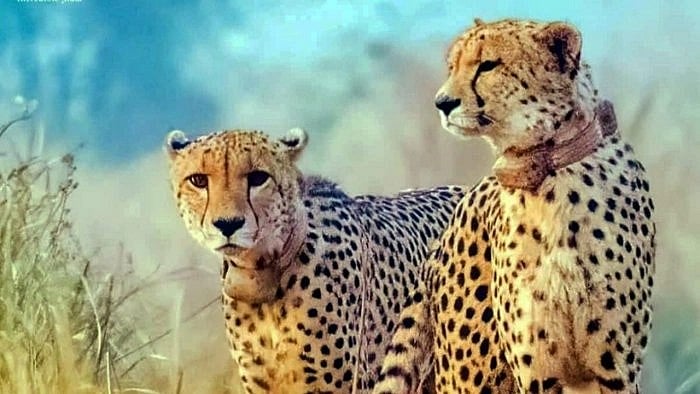
File photo of cheetahs at the Kuno National Park in Sheopur district, MP.
Credit: PTI Photo
New Delhi: The Union environment ministry has deferred Madhya Pradesh's proposal seeking diversion of over 740 hectares of reserve forest land in Sheopur district for the construction of a dam and micro irrigation system, citing the need for further study and a no-objection from Project Cheetah.
The proposed project area falls within the landscape of the Kuno National Park, where cheetahs were translocated from Africa starting September 2022.
The ministry's Forest Advisory Committee (FAC) said the state must obtain comments or a no-objection certificate from Project Cheetah under the National Tiger Conservation Authority (NTCA) before any clearance is granted.
The FAC, which met on September 26, examined Madhya Pradesh’s request for non-forestry use of 740.159 hectares of reserve forest for the irrigation project on the seasonal Aheli river near Munjari village in Baroda tehsil.
The river flows only during monsoon and remains dry for most of the year.
Officials told the committee that the project would help impound water for a longer period, which would benefit about 40,000 families in 34 villages.
Due to low rainfall and dry conditions, flora, fauna, local cattle and people are facing "water scarcity". The project would benefit a population of around 19,000 in 34 villages, the proposal said.
The irrigation scheme is expected to boost agriculture and improve crop yields in the drought-prone region, where the catchment area is about 300 square kilometres. No families will be displaced, according to the state government.
However, the project involves felling more than 20,000 trees and submerging nearly 700 hectares of forest.
The total land requirement is about 1,013 hectares, including 273 hectares of non-forest and revenue land. The forest area to be diverted has sparse vegetation with canopy density between 0.1 and 0.3 and falls under Eco-Class III.
The FAC noted that the site is more than 10 km from the Kuno National Park and over 20 km from the Chambal Gharial Sanctuary, but given the ecological sensitivity of the region, it called for a detailed assessment of the potential impacts.
The committee said the state must conduct a comprehensive study on the river's seasonal water flow, affected villages, the project's benefits, and its downstream impacts before a decision is made.
It also asked the government to explore the availability of larger compensatory afforestation patches in the adjoining districts.
The state government told the committee that the excavated material from dam construction will be reused for levelling land and building ancillary infrastructure, avoiding muck disposal elsewhere.
Seventy years after the species went extinct in the country, the government launched Project Cheetah in 2022 to reintroduce the big cat in Indian forests.
As part of this effort, 20 African cheetahs were brought to Kuno National Park -- eight from Namibia in September 2022 and 12 from South Africa in February 2023.
Eleven of them have survived, including two that were transferred to the Gandhi Sagar Sanctuary in April. Since the introduction, 26 cubs have been born, of which 16 survived.